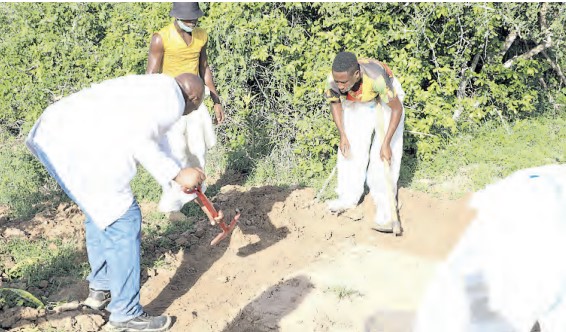Shakahola tragedy: Over 600 still missing - KNCHR
The KNCHR said it had documented 448 deaths.
Hopeless relatives have searched endlessly for their loved ones
In Summary

Do you have, or suspect, that a missing loved one could have died in the Shakahola cult activities? Are you yet to identify them? Sorry, the wait could be longer.
Kenya National Commission on Human Rights has said the government chemist - the agency conducting DNA matching of the victims with those claiming the bodies - has been cash-starved and unable to expedite the process.
“The commission further notes that only less than 10 per cent of the bodies have been identified and handed over to the families for interment with dignity as per their cultural and religious beliefs,” KNCHR said.
The commission documented 448 deaths and recorded statements suggest over 600 people are still missing. Where the profiling has been done, the commission says, the majority of the results have been negative, killing the hopes of relatives who have searched endlessly for their loved ones and in so doing, get closure.
During the year, exhumations at the Shakahola forest continued, even as suspects of the massacre went through the legal process in court.
The deaths came to light in 2023, when a number of mass graves were found in the forest, leading to an investigation. Pastor Paul McKenzie’s church, Good News International Church, was implicated in what is now known as the Shakahola forest massacre. The 800-acre forest is part of Chakama Ranch in Kilifi County.
McKenzie and scores of church members are currently facing criminal charges.
Roselyne Anyango (not her real name) is one such distraught family member, whose sister Jane lived in Kilifi.
Jane visited their home in Alego in December 2019, for the endyear festivities and left for Kilifi in January 2020.
That was the last time they saw her, but the family communicated with Jane over the phone. They lost touch at the start of 2021.
“She was a devout member of a church that always preached end times and going to heaven and I suspect it was this one of Paul McKenzie,” Anyango said.
Anyango has been to the morgue several times hoping to find her sister’s body.
“I can’t tell you how much my parents are overwhelmed with this unending search for Jane. They always ask if the result found the body so we bury her and move on.”
It is the same fate for the family of John Koech, who says his brother William Cheboi - a high school teacher - joined “a mysterious church and from then we have never heard from him”.
Koech says he has been to Shakahola countless times in the search for Cheboi and a body with features like his brother’s was recovered from a shallow grave.
“The push for DNA testing has been more painful than the search for the body itself. It’s been costly and the family has had to contribute money all over from relatives and community to pay the charges and help sustain me over here as I keep the search,” Koech said.
He said most of the DNA profiles have been negative but he is not losing hope. Prof Marion Mutungi, a commissioner at KNCHR, blamed poor prioritising by the state.
“We know that the government chemist falls under the Interior Ministry which often has a large budget,” Mutungi said.
“We know that preserving these bodies is even more costly, hence the need to deploy resources to conclude the process and give the families reprieve.”
According to the KNCHR, the
process would have been easier, investigation into the deaths streamlined and accountability enhanced
,had the National Coroners Service
Act, 2017, been operational.
The KNCHR said it had documented 448 deaths.